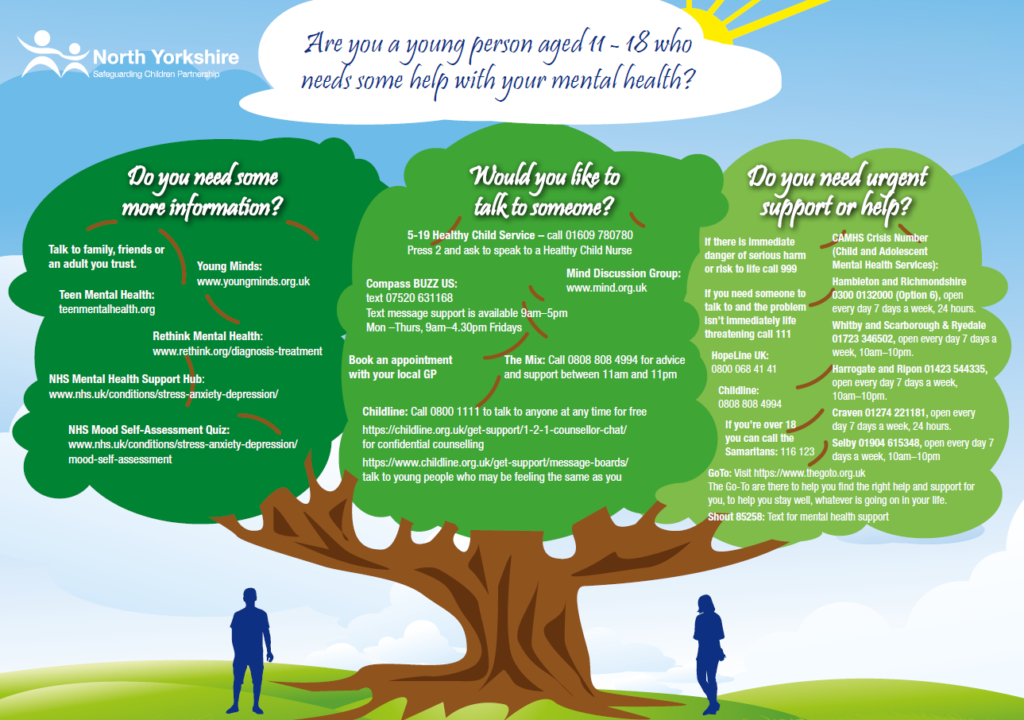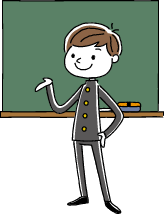Mental Health

Mental illness and suicidal thoughts can affect anyone, of any age, of any background, at any time. Like with being ill physically, people don’t choose to have a mental health problem. And they need the appropriate care to get better.
Mental illness and suicidal thoughts are common issues for young people, and you may feel as though you need to keep it to yourself. But with the help of the NSPCC and a number of other services there are a number of ways you can spot the signs:
Everyone feels down sometimes, but depression is more than this. People with depression feel sad for long stretches at a time – and this can be experienced by young people as well as adults.
This is similar with anxiety. Everyone feels nervous from time to time. But some people find it harder to control anxiety.
Children and young people can find it especially difficult to express their feelings and open up to others. If they’re suffering from depression they may feel like there is no hope and find it difficult to imagine ever being happy again. Or, if they’re highly anxious they may be even more worried about talking to someone about how they feel.
Self-harm can take lots of physical forms, including cutting, burning, bruising, scratching, hair-pulling, poisoning and overdosing.
There are many reasons why children and young people try to hurt themselves. And once they start, it can become a compulsion. When a person self-harms, chemicals are released into the brain which can become addictive very quickly.
Self-harm is often used as a coping mechanism. The physical pain of self-harm might feel easier to deal with than the emotional pain that’s behind it.
Sometimes it can be a way for someone to punish themselves for something they’ve done. It can also make them feel they’re in control of something in their life.
The person may feel an instant relief of pressure and ‘bad feelings’. This relief is short lived and is often replaced by feelings of guilt and immediate pressure. And this is how the cycle continues.
Physical signs of self-harm:
These are commonly on the head, wrists, arms, thighs and chest and include:
– cuts
– bruises
– burns
– bald patches from pulling out hair
Emotional signs of self-harm:
The emotional signs are harder to spot and don’t necessarily mean that a young person is self-harming. But if you see any of these as well as any of the physical signs then there may be cause for concern.
– depression, tearfulness and low motivation
– becoming withdrawn and isolated, for example wanting to be alone in their bedroom for long periods
– unusual eating habits; sudden weight loss or gain
– low self-esteem and self-blame
– drinking or taking drugs
Some children may feel like there is no hope or might think about ending their life.
Whilst thinking about suicide is relatively common, very few young people will actually attempt to take their own lives. However even having suicidal thoughts clearly shows someone is unhappy and needs help and support.
It can be difficult to understand what causes suicidal feelings but they’re often triggered by upsetting experiences such as:
– living with mental illness
– experiencing abuse
– being bullied
– bereavement after losing a loved one
– being forced to marry
– having very low self-worth
All children are different but some of the common signs of mental health problems in children include:
– becoming withdrawn from friends and family
– persistent low mood and unhappiness
– tearfulness and irritability
– worries that stop them from carrying out day to day tasks
– sudden outbursts of anger directed at themselves or others
– loss of interest in activities that they used to enjoy
– problems eating or sleeping
How to get some help
It’s important that you get the right help for a mental health problem, suicidual thoughts or self-harm.
There’s lots you can do to help improve your wellbeing but sometimes you may need to ask professionals for help and support.
YoungMinds offer advice and support to adults, parents and professionals who are worried about the emotional welfare and behaviour of a child or young person.
YoungMinds also help children to improve their mental health and emotional wellbeing. So you could show their website to a young person if they’re struggling with mental health problems.
SelfharmUK support young people who self-harm. They also give advice to their parents, siblings and friends.
Family Lives speak to anyone in a care-giving role who wants advice on any issues around parenting, such as self-harm and depression and the effect on other family members.
Papyrus speak for free to young people under 35 that are feeling suicidal as well as anyone (like family, friends or professionals) concerned about a young person at risk of suicide.
The Samaritans offer support and advice to anyone experiencing feelings of distress, despair or considering suicide and are available 24 hours a day.
The Go-To are there to help you find the right help and support for you, to help you stay well, whatever is going on in your life.
Young People: – Life can be challenging. Family life, friends, school, work and many other things can leave you feeling stressed, sad, lonely or worried. The most important thing to remember is you’re not alone and looking for advice and support is exactly the right thing to do.
Parents / Carers: – Whether toddlers or teenagers, children can need emotional support – and for many reasons too. If you’re a parent or carer, we have resources which might help.
Professionals:- If you work with children and young people, you’ll know that they experience a wide range of feelings, emotions and challenges. The Go-To contains resources, links and information to support professionals in North Yorkshire.
The Go -to website also have a suite of resources to ensure children and young people across North Yorkshire are aware of services available to support with their social and emotional mental health and include:
A Mini Marketplace and a Needs based guidance for Social and Emotional Mental Health (SEMH) for Children and Young People In North Yorkshire to support professionals working with or parents and Carers with Children/Young People across North Yorkshire find the most appropriate mental health support based on a child/young person’s needs.
A Young Person’s guide to Mental Health Support A resource created and designed by young people across North Yorkshire for young people to help them find the right support, whether it be finding out more information, talking to someone or accessing more specialised support. A printable version can also be accessed by clicking here
Compass REACH are a free, confidential health and wellbeing service for children and young people in North Yorkshire who need support with issues related to drugs, alcohol, mental health and / or sexual health.
Compass Phoenix (previously Compass Buzz) offers a confidential text messaging service to young people aged 11-18 across North Yorkshire. By texting the service on 07520 631168 you will be able to receive confidential advice, support and signposting from a wellbeing worker within one working day via text.
It’s a really difficult situation, but there are plenty of people who can help.
Your first step should be talking to somebody you trust. This could be a parent / carer, another family member or a friend. Talking to somebody who can listen to you, can really help you feel better about the issue you are experiencing and make you feel as though you are not having to deal with this on your own.
Visiting your doctor can help in a few different ways. They can listen – if your willing to talk to them. If you have been self-harming the doctor will be able to treat injuries and give medical advice.
They could also refer you for specialist help if you need it. This could be a therapist who will work with you to discuss your thoughts and feelings and how this is affecting you.
Speak to somebody you can trust at school, this could be your form teacher or a teacher you have a good relationship with.
Teachers are becoming increasingly aware of child self-harm and mental illness. The school will almost certainly have experience of helping other pupils and their families.
The school should be able to provide a named member of staff who you can go to if they’re struggling with low mood or wanting to harm themselves. This might be a counsellor, a mentor or a nurse, for example.
You are at school for a large part of the day so having staff aware of the concerns and keeping an eye out for you during this time can be reassuring.
Childline has trained counsellors who can help you to talk about the emotions you may be feeling. It’s a safe space for children to think about ways to improve your situation. You may find it easier to open up to someone they don’t know.
Childline talks to under 19’s online or over the telephone on 0800 1111. Calls are free and do not show up on itemised phone bills.
Childline’s website offers advice on many topics that affect young people such as mental illness,
depression, self-harm, suicidal thoughts and coping with exam stress.
The NHS Blog contains a lot of information which can help you understand what you are feeling, who you can ask for help and where you can go for help.
For more information visit the NHS Blog at www.england.nhs.uk/blog/what-to-do-if-youre-a-young-person-and-its-all-getting-too-much-2
In North Yorkshire there are a number of services who can help in relation to your mental health and wellbeing, they include North Yorkshire CAMHS, Compass REACH, Healthy Child Team, and North Yorkshire Council Children & Families Service. Visit the Do you need some help page for further details on what these services offer and how you can access support from them.
North Yorkshire Youth Voice have produced information and guidance for children and young people concerned about their mental health, in the form of the Mental Health Flowchart below. To download a copy click on the image:

Who else can help?
Action for Children is supporting children with parent issues and have a 1 to 1 chat service.
Mind understands mental health and wellbeing they are here for you if you’re finding things hard. They help everyone understand mental health problems, so no one has to feel alone.
Sport England is helping people stay active whilst they are at home.








 View all our news
View all our news